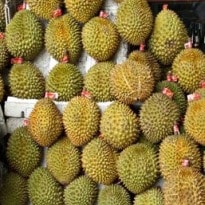The prized Malaysian musang king durian has reached British shores for the first time. Are you tempted to try the pungent, custardy fruit?
Nose pegs at the ready ... musang king durians are now on sale in the UK. The infamous durian - regarded the king of fruit in much of south-east Asia - is best known for its pungent smell, variously compared to sewage, rotting flesh or, at best, ripe cheese. The green, spiky durian is an awkward travel companion: it is banned on Singapore's rail network, as well as many in airports and hotels in south-east Asia. Durians polarise people. Fans say if you can get past the stink, the flesh has an ambrosial taste. "Aficionados will travel terrible distances ... do anything ... to scarf down globs of custardy flesh from a durian," writes Thomas Fuller of the New York Times in a recent ode to the fruit.
While durians have long been available in Chinese supermarkets around Britain, this is the first time the prized Malaysian variety has been on sale in the UK, although thus far it is restricted to Loon Fung stores in London. Musang kings are left to ripen naturally on the tree; the growers spread large nets underneath and wait for them to fall. They are collected and vacuum-packed on the same day to preserve their ripeness. The fruits don't smell while still in their packaging, promises a spokesperson for Malaysia Kitchen, which promotes Malaysian food in the UK. Once you open the packaging, however, you're on your own. Do it in the garden, or at least with all the windows flung open.
Masterchef winner and chef Tim Anderson is coming round to durians. "I first tried durian in Thailand. The smell is so strange: onions and meat, if I'm being charitable. Some people say it smells like dead rats." Anderson persevered with the durian, however, and is now working with Malaysia Kitchen to create recipes. He has used it in a silky gelato with coconut and ripe banana, which, he says, are the closest foods to durians in texture and taste: "The durian's flavour isn't far off an overripe banana."
Many people find it hard not only to get past the durian's stench, but also to reconcile this smell with the sweetish, "custardy" flesh inside. "The smell is savoury but the flavour is sweet," says Anderson, who has also tried durian in a risotto instead of cheese, served with ox-cheek rendang.
Of course, its notoriety could be the very thing that makes the durian a success in the UK. "I know loads of people put off by the smell of kimchi, but that's getting really popular," says Anderson. Will musang kings become a similar cult hit - a must-try for curious food lovers, or a macho feat for those that seek out the world's hottest chillies and biggest burgers? The durian is surely on any tick-list of the world's stinkiest foods, along with French vieux-boulogne cheese and Swedish surströmming, the fermented herring that made even Hugh Fearnley-Whittingstall balk on his current TV show, Scandimania.
Blogs and online articles explain "How I learned to love durian", for those who want to push past the stench. Others will ask: why bother? Anderson thinks durians will remain a niche food: "I don't think we'll see them on the menu at a Jamie Oliver restaurant soon." Perhaps something will be lost in translation: a ripe durian scoffed on a Malaysian beach is surely a more exciting proposition than eating one in a Middlesex semi. Either way, Boris Johnson may wish to draw up the wording for a durian tube ban, just in case they become this year's burger. Love them or hate them, no one wants to smell durians in a packed train carriage.
Photo: A woman selling durians. Photograph: Cesar Torres/Demotix/Corbis








